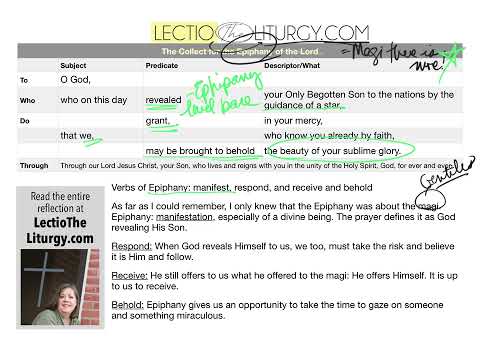Collect for Epiphany
As I meditated on this prayer, the Collect for the Epiphany of the Lord, I realized that as far back as I can remember, what I learned about the Epiphany was about the magi, but there is a more important side to the story.
O God, who on this day revealed your Only Begotten Son to the nations by the guidance of a star, grant in your mercy, that we, who know you already by faith, may be brought to behold the beauty of your sublime glory. Through our Lord Jesus Christ, your Son, who lives and reigns with you in the unity of the Holy Spirit, God, for ever and ever.
The word epiphany means manifestation, especially of a divine being. The prayer defines it as God revealing His Son. In the Latin prayer, reveal means laid bare. Through Jesus, God showed the magi exactly who He is. Along with the magi’s Epiphany, the Baptism of Jesus, and the miracle at Cana are also epiphanies, events where God revealed His light and presence to the world through Jesus.
As far back as I can remember, Epiphany was about the Magi, but the flip side of Epiphany is - God revealed.
In the event of the Epiphany, the magi, led by a star, go to Jerusalem to pay homage to the one who is the king of the nations. They represent the neighboring pagan religions, or the Gentiles. The Catechism of the Catholic Church paragraph 528 teaches us us that all people of all faiths and nations can discover Jesus and worship him as the Savior only by receiving from the Jews the messianic promise of the Old Testament.
There are four important verbs in the story of the Epiphany: manifest, respond, receive and behold. Manifest is what God does. The rest is up to us.
When God chose to reveal Himself to the magi, he led them with a star. God uses many ways to make Himself known to us. It may be through scripture, or mental prayer, through our senses, or knowing in our intellect. He may even give us opportunities that seem like a coincidence. These revelations can be small or big, anywhere from a sense of peace to a word or name that pops into your head, or it could be something big, like Jesus actually becoming present to you.
No matter how God makes Himself known to us, we need to do what the magi did: respond, receive, and behold. The magi saw a light and responded by stepping out in faith to follow. When God reveals Himself to us, we too, must take the risk and believe it is Him and follow.
The magi received the Child as King, and in a way, they received this gift for all of us. The Savior of all nations was made known to us through them. Because of the magi, we can receive the Savior as well. When we sense God’s presence, we, too, need to acknowledge Him and accept what He wants to give. He still offers to us what he offered to the magi: He offers Himself. It is up to us to receive.
But in between respond and receive, we need to behold. In the Latin form of the prayer, for the word behold, we find the word contemplandam, meaning to gaze at, to contemplate. In Greek, behold means be sure to see.
Epiphany gives us an opportunity to take the time to gaze on someone and something miraculous. Actually, the request of our prayer is that we may be brought to behold the beauty of your sublime glory. When the prayer tells us that God’s glory is sublime, it means the glory is filled with beauty to inspire great admiration or awe.
God reveals Himself to us every day. Every day He waits for us to respond, behold, and receive. We already know Him by faith, and as we begin a new year, may we grow in faith to always respond, behold, and receive all that He offers.
Thanks for praying with me,
Julie
